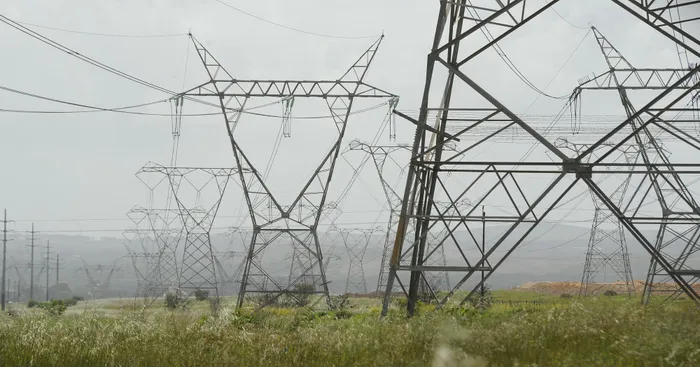
Salga said there was inherent danger of fragmentation on distribution with Eskom.
Image: Henk Kruger / Independent Newspapers
The South African Local Government Association (Salga) has said the Distribution Agency Agreement (DAA) aimed at addressing the ballooning R105 billion debt to Eskom is not sufficient in itself, pointing to inefficiencies with Eskom's systems and lack of capacity of the National Energy Regulator of South Africa (Nersa) to efficiently regulate 167 municipalities with only a 400 staff complement.
Salga told Parliament on Friday that it was seeing a surge in the repeated deterioration and aging of infrastructure, the decline in financial sustainability in municipal distribution businesses, the poor asset management and outdated technologies, the rising operational costs and severe revenue losses, escalating vandalism theft and illegal connections at the municipal level.
Salga said there was inherent danger of fragmentation on distribution with Eskom, along with 167 municipalities licenced to provide independent electricity distribution.
"We are saying it is not only municipalities that don't have capacity. Eskom equally has its own challenges in terms of capacity. In terms of free basic electricity, Eskom has the sole responsibility in the small towns. Communities come back to the municipality after we have registered them to say that they are not able to access. And when you go to Eskom, it's a mix-up in their system. Municipalities are unable to actually implement their own credit control because Eskom does not award them that particular thing," Salga Councillor Kenalemang Phukuntsi said.
According to Salga, the consumer debt to municipalities amounts to R41.3 billion as of March 2024, with R95bn owed to Eskom as of the same period.
Salga head of Energy Nhlanhla Ngidi said there was an at least R100bn backlog in infrastructure maintenance. He pointed out that 78% of municipal electricity sales revenue came only from 15 of the largest municipalities while less than half of licensees complied with Nersa licensing requirements.
Ngidi said two thirds of the municipalities electricity business was unsustainable.
Ngidi said the 20% critical technical vacancy rate in municipalities distribution was now further threatened with the emergence of the elecricity free market next year, which is likely to hemorrhage the skills base of both municipalities and Eskom to the private sector.
"There's an energy market that is set to start on the 1st of April next year. While it's going to commence or be launched, the sector that is supposed to distribute the electrons to the customer is having challenges. It's got challenges. And that talks to municipalities including Eskom as well. So the issues around municipalities blocking the expansion of Eskom. It might be true to some extent, but also the country's systemic and structural issues or challenges also block municipalities from preparing themselves to be able to be ready to participate in the market when it comes," Ngidi said.
He said there is a lot of opportunity that might be lost when the market starts and municipalities, including Eskom distribution, have not really found themselves or located or placed themselves at a position where they can actually engage with the energy markets. He said there was also uncertainty on the implementation of the Just Energy Transition (JET) with regard to the financial capacity of municipalities.
"As much as Salga has been together with the JET PMU to put together or to put in place structures that should execute the work that needs to happen under JET. But I think the elephant in the room is where the money is going to come from. Do we have the money to actually implement JET in municipalities? And when you deal with JET topics in municipalities, the feedback that you get, especially from our political leaders, is if this will not be just if it's going to be loans. It's going to just further perpetuate the current situations that we have. And even further to that, we are not structured and our performance is not sitting at a place where we can actually get financing for JET. So the government needs to rethink how we are going to unpack the JET," Ngidi said.
He said while the debt to municipalities on electricity was at R41.3bn, the debt to municipalities on oil and gas is currently sitting close to R360bn.
BUSINESS REPORT